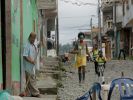Eye For Film >> Movies >> Chocó (2011) Film Review
"To my mother, my father and my son for teaching me that being black is a miracle."
This is the text that opens Chocó, the directorial debut of Jhonny Hendrix Hinestrosa – a film which will indeed concern itself with education and the example set by parents in an Afro-Colombian family. Chocólatico (the director's wife Karent Hinestrosa) - from whose nickname the film takes its title – works both as a washerwoman and as a gold-panner, looks after her children Jeffrey (Sebastián Mosqueira) and Candelaria (Daniela Mosquera), and prays regularly to Saint Francis for redemption. Meanwhile Chocó's feckless husband Everlides (Esteban Copete) plays marimba, gambles, spends all his money on booze, and most nights staggers home drunk to rape Chocó several feet from where the children lie.

"I won't allow any violent behaviour in this house," Chocó will insist when she finds Jeffrey pretending to shoot Candelaria with a stick. Jeffrey's excuse is that he learnt it from his father – and much as Everlides does not work, Jeffrey has begun secretly absenting himself from school. Yet when Jeffrey throws his sister into the river for calling another boy names, Chocó rounds on her daughter: "Who told you you can call a man a moron?" Indeed, when Chocó publicly rebukes Everlides for his astonishingly selfish behaviour, he punches her down to the ground – and no one bats an eyelid, let alone comes to her help. Asked by Candelaria: "Mum, why does my dad beat you up so much?", Chocó responds gravely: "He doesn't beat me up that much." These, it seems, are the ironised lessons of patriarchy, handed down from one generation to the next.
The African women in this village may in a previous era have been slaves, but we are left to wonder how much freedom they have gained as they still sing their slaves' songs on the way to the local mine where they continue to be exploited, underpaid and exposed to mercury poisoning. Only Américo (Lui Américo Mosquera Mosquera) seems to offer an alternative with his traditional artisanal mine, while Chocó retreats from the harshness of her reality into faith, idyllic jungle daydreams, and fiery castration fantasies. Yet although the film is shot wide by an unmoving camera in full naturalist mode, we ultimately remain uncertain whether Chocó has taught Everlides a lesson, or just dreamt that she has.
Still, if the plot (such as it is) of Hinestrosa's film is driven by Chocó's increasingly desperate attempts to purchase a cake for her daughter's seventh birthday, then this pursuit will certainly lead to an act of self-humiliation with the racist Paisan shopkeeper Ramon (Fabio Restrepo) that is also an altogether more subtle brand of revenge against both patriarchy and racial identity. For Chocó will have her cake (and eat it too), while Everlides merely gets his just des(s)erts. Even if Everlides does wake up with his house (and his penis) still intact, one suspects that Chocó's next child may be a little less black than its supposed father.
Reviewed on: 13 Mar 2013


















